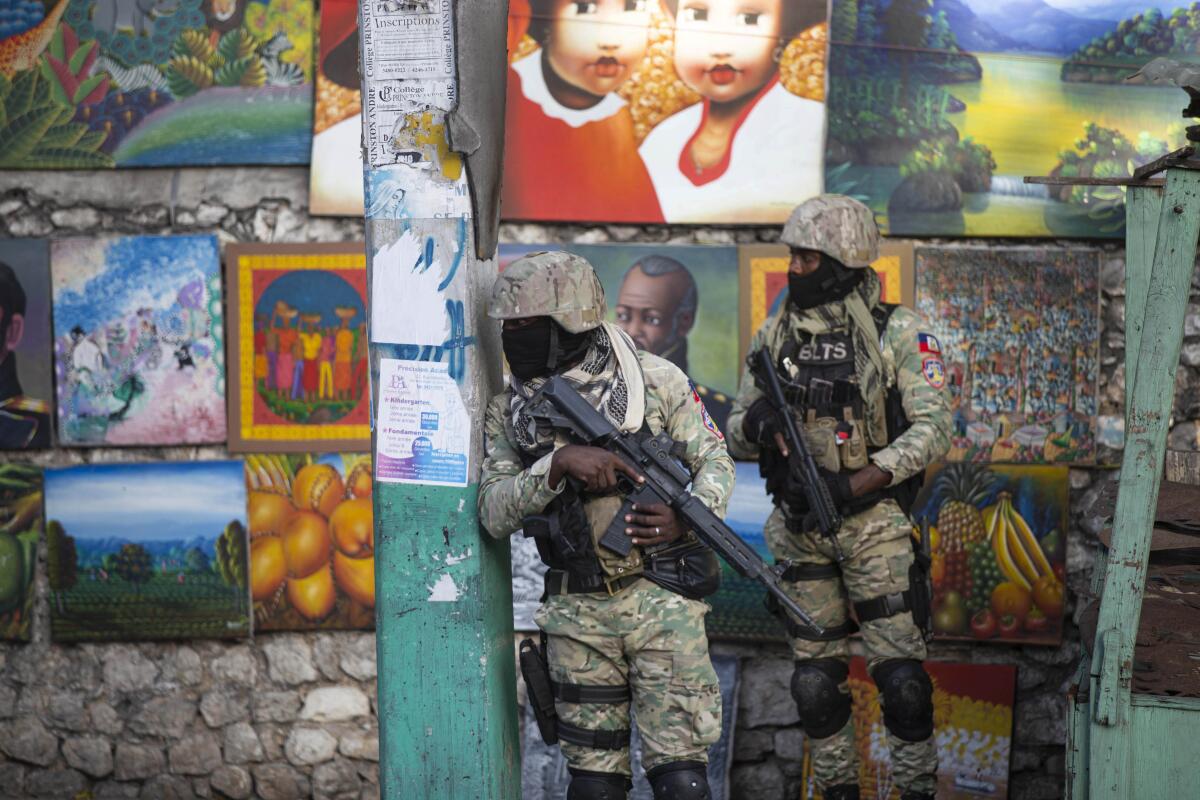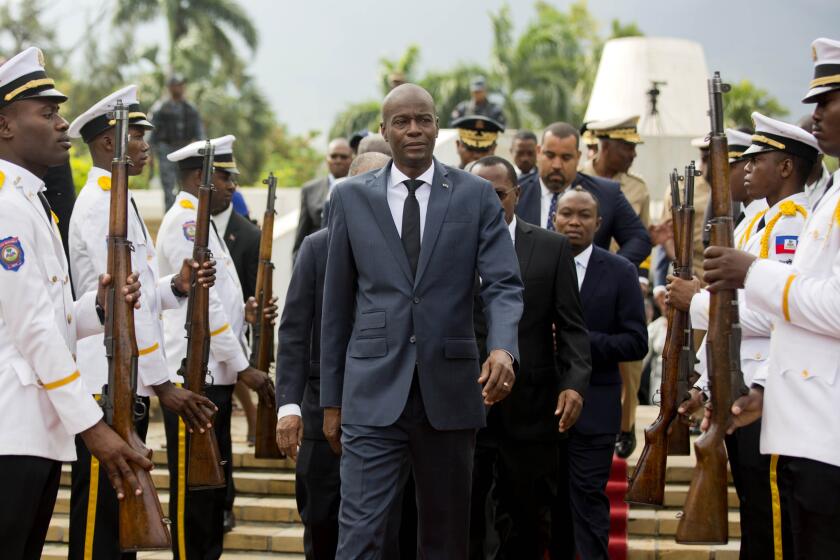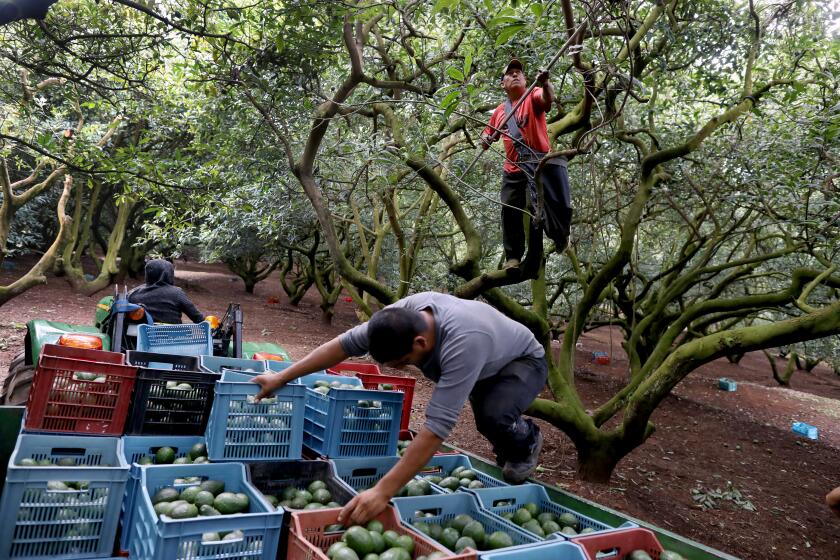After the assassination of Haiti’s president, it’s unclear who will lead the country

MEXICO CITY — Even in a country with a grim history of coups, dictatorships and foreign interventions, Haiti’s political turmoil over the last several months stood out for its violence and volatility.
The president, Jovenel Moise, had been ruling by decree despite a legal consensus that his term had expired — triggering widespread pro-democracy protests.
Meanwhile, armed gangs were broadening their power, kidnapping and killing with abandon. Every day seemed to bring news of another massacre, more heartache for a nation already struggling to contain soaring inflation and the relentless spread of COVID-19.
The assassination of Haitian President Jovenel Moïse is the Caribbean nation’s latest tumultuous chapter.
That pressure cooker appeared to burst early Wednesday when assassins stormed the president’s home in the hills of Port-au-Prince under the cover of darkness and shot him to death.
The killing of Moise, 53, a wealthy banana exporter who took office in 2017 after elections marred by allegations of fraud, could plunge the Caribbean island nation into deeper chaos.
As Haitians huddled inside their homes Wednesday and the country’s interim prime minister declared 15 days of martial law, urgent questions swirled about who killed Moise and why. But another unknown loomed even larger: Who will take control of Haiti now?
Claude Joseph, whom Moise appointed interim prime minister in April, immediately declared himself in charge, issuing statements calling for calm and vowing to solve the killing and bring the assassins to justice.
Yet Joseph was never officially sworn in, largely because Moise’s refusal to call elections left Haiti without a functional Parliament.
Then there’s the fact that just two days before he was killed, Moise had announced the appointment of a new prime minister — a relatively unknown neurosurgeon named Ariel Henry.
The nation’s judicial branch is not a likely source of stability. Last month, the sitting president of the Supreme Court died of COVID-19.
Fears that gangs might take advantage of the gaping power vacuum have raised the specter of international intervention — with some in the United States calling for the deployment of a United Nations peacekeeping force.
But many Haitians vehemently oppose such a move, arguing that the international community bears some responsibility for the current political crisis.
It’s not just drugs. Mexico’s cartels are fighting over avocados.
Moise, a political novice who branded himself the “banana man” when he ran for president in 2015, only took office after the country held a do-over election and the United States urged opposition parties to acknowledge his victory.
That meant that he assumed power a year after the five-year term was supposed to begin, a delay that Moise said entitled him to remain president for an additional year. The U.S. and the Organization of American States supported him.
But most Haitian legal experts and opposition leaders disagreed. In February, when the term was supposed to have ended, the president’s opponents tried to name a Supreme Court judge interim president — a move Moise decried as an attempted coup and punished with dozens of arrests.
Moise vowed to hold new elections — a proposal backed by the international community. But many Haitians doubted the legitimacy of a vote organized under his government and instead threw their support behind the establishment of a transitional government.
“How could you have elections when you have a president that is ruling by decree who handpicked the election officials?” said Jemima Pierre, a Haitian-born professor of African American studies at UCLA.
As the constitutional crisis mounted, so did violence. A surge in killings and kidnappings for ransom has forced thousands to flee Port-au-Prince in recent weeks. Last week, a journalist and a human rights activist were among 15 people killed execution-style in an attack believed to have been carried out by a faction of disgruntled police.
The violence reached a new level this week.
There are still many questions about Wednesday’s assassination, but Haiti’s ambassador to the United States, Bocchit Edmond, said it “was carried out by well-trained professionals, killers … mercenaries.”
Videos of the assassination showed the gunmen speaking Spanish among themselves, Edmond said in a Zoom briefing with reporters in Washington, leading officials to believe that “they came from outside Haiti.” He said the president’s wife, Martine, was wounded in the attack and was being transported to a Miami hospital in critical but stable condition.
Edmond called for international assistance, especially from the United States, both in the investigation and hunt for the killers and in better equipment for the Haitian national police and armed forces.
Haiti’s army was disbanded in 1995 after a military coup overthrew then-President Jean-Bertrand Aristide, who was eventually reinstated by a U.S. military invasion. Moise reconstituted the army at the start of his term but it has struggled to gain international training and recognition. Critics worried that Moise wanted an army to help preserve his own grip on power.
“It is time to stop stigmatizing the armed forces,” Edmond said. “Let us have an army. If we had an armed forces that was controlling the border, this [attack] would have been more difficult.”
But many Haitians are against that.
“We don’t want this to be used as a pretext to militarize the country,” Pierre said.
Others oppose other forms of international intervention, including the sending of peacekeeping troops.
U.N. troops were sent to Haiti in 2004 after a rebellion brought down Aristide. That mission was extended after a devastating 2010 earthquake killed at least 200,000 people.
But an academic study documented widespread sexual abuse by the peacekeepers, whose mission was also blamed for introducing a devastating cholera epidemic.
Some critics have accused the Biden administration of essentially continuing Trump-era policies that turned a blind eye to the island’s desperation and allowed Moise to survive. In one reversal, however, President Biden renewed temporary protected status for tens of thousands of Haitians who have fled to the U.S., extending their legal stay in the country by 18 months.
In the dozen years she has lived in the U.S., Farah Larrieux has built a successful career in southern Florida as a bilingual television host and Haitian American community activist.
Pierre Espérance, executive director of the National Human Rights Defense Network, an NGO in Port-au-Prince, said the international community should support civil society in its call for a transitional government.
“We’re not asking the Biden administration to solve everything, we’re asking them to listen to us,” he said.
The whole country, he said, was united in uncertainty. “For now it’s eerily quiet,” he said. “We don’t know what will happen today or tomorrow.”
Times staff writer Tracy Wilkinson contributed to this report from Washington.
More to Read
Sign up for Essential California
The most important California stories and recommendations in your inbox every morning.
You may occasionally receive promotional content from the Los Angeles Times.













